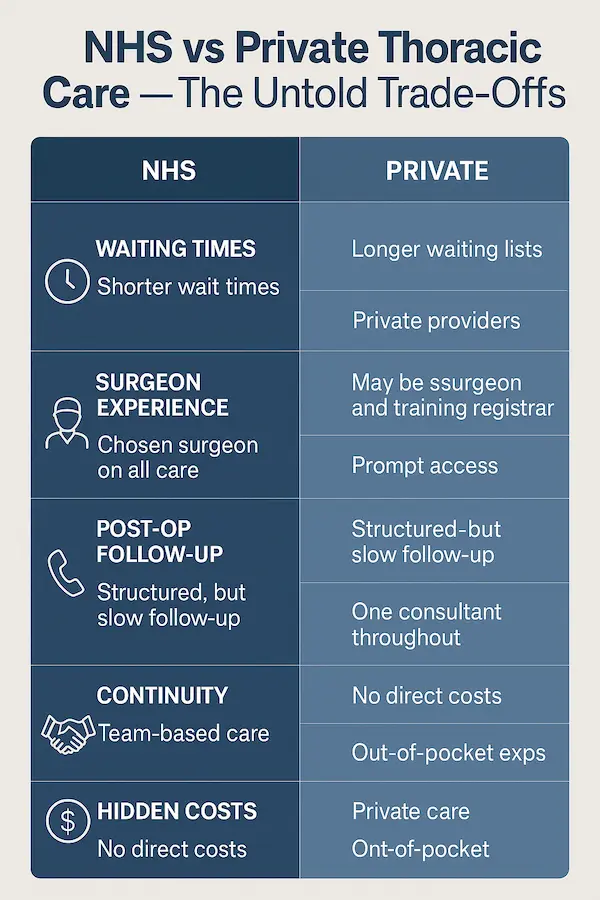I’ve operated on patients in both the NHS and private sectors for years, and I’ve seen the best—and the worst—of each.
Most patients, understandably, don’t know what really differentiates NHS from private thoracic care beyond cost and waiting lists. And most surgeons don’t publicly compare the two.
But we should. Because it’s not just about access—it’s about expectations, continuity, risk tolerance, and what happens after the operation.
So let’s break it down—honestly—with real patient scenarios.
1. Waiting Times: The Urgency Dilemma
Peter, 67, had a 2.5 cm lung nodule discovered on a CT scan. His NHS pathway estimated 8–10 weeks to surgery. But Peter was anxious—his father had died of lung cancer. He went private.
He was in the operating theatre in 9 days.
NHS: Excellent triage for high-risk cancer. But borderline cases wait. Resource limits are real.
Private: Fast. Flexible. But sometimes too fast—patients may undergo surgery before full multidisciplinary input.
Trade-off: Speed can save lives—or short-circuit preparation. Private care often wins here, but it must be done with safeguards.
2. Surgeon Experience: “Who’s Operating on Me?”
In both sectors, the same consultant surgeons often operate. But not always.
Emily, 54, had her VATS lobectomy on the NHS—but only met her consultant once. Most of her pathway was handled by registrars.
In private care, that same consultant would perform every stitch and be present at every follow-up.
NHS: Team-based, teaching hospital model. Excellent—but less continuity.
Private: More personal, one-to-one care. But fewer second opinions built-in.
Trade-off: NHS care is robust, but you may not always know who’s holding the scalpel. Private patients often choose based on named surgeon confidence.
3. Post-Op Follow-Up: One Call Away or One of Many?
James, 60, had a pneumonectomy on the NHS. Discharged well. But when chest pain hit three weeks later, his GP was his only access point. It took 5 days to reach the thoracic team.
Compare that with a private patient, who texted me at 9pm on a Sunday with similar concerns—and was seen within 12 hours.
NHS: Follow-up is structured, but slow. Urgent issues often go through A&E or GP filters.
Private: Direct line to your surgeon. Same-day consults possible.
Trade-off: If peace of mind and rapid response matter to you post-op, private care delivers. But it comes at a cost.
4. Continuity: One Consultant or A Rotating Roster?
Sandra, 71, had a wedge resection in the NHS. Her pre-op consult was with one surgeon, her operation was done by another on call, and her follow-up was with a third.
Compare that with Raj, a private patient who saw me at every stage—from first consult to discharge.
NHS: Excellent multidisciplinary care. But high turnover of who you see.
Private: One point of contact. Start to finish.
Trade-off: The NHS excels at team care, but you may feel anonymous. Private care offers consistency, but not always redundancy.
5. Hidden Costs: What’s Not on the Invoice?
Many patients assume private = expensive. And yes, it is—initially.
But there are hidden “costs” to waiting. Delayed diagnosis. Time off work. Anxiety.
That said, some patients are surprised by what private insurance doesn’t cover—like follow-up scans or complications after discharge.
NHS: Free at point of care. But opportunity costs (time, delay, lost earnings) are real.
Private: Clear pricing—but surprises happen. Always check what’s included.
Trade-off: NHS care won’t bankrupt you. But private care can give time and peace of mind. Both have “costs”—they just wear different clothes.

So… Which Is Better?
That’s the wrong question.
The right question is: What matters most to you, right now?
- If you value speed, personal continuity, and responsiveness—private care often wins.
- If you want a robust system with depth, safety nets, and no out-of-pocket costs—the NHS is extraordinary.
What I can promise is this: the skill of the surgery is rarely the difference. It’s everything around it that makes the difference.
Final Thought
Whether you’re choosing NHS or private thoracic surgery, ask your surgeon these two questions:
- Will you be the one doing my operation?
- What happens if something goes wrong after I go home?
Your peace of mind depends not just on the operation—but on the clarity around it.
And that’s a trade-off worth understanding.